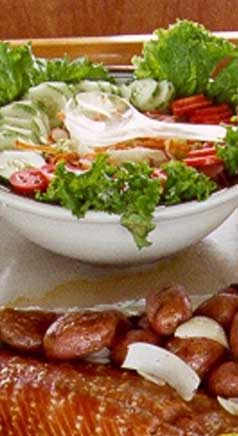


![]()
HOME > NOURISHING NEWS
June 2023
Preserving Nutrients in Produce
Get the most nutrients out of your produce! Storage and preparation methods have an impact on preserving vitamins, minerals and phytonutrients. Temperature, humidity and light can speed up or slow down the ripening process and degrade produce. This not only reduces nutrients, it also contributes to food waste. Here are some simple tips to preserve nutrients in produce.
Preparation Methods to Preserve Nutrients
- Reduce Cooking Time – more nutrients are lost when exposed to heat for longer periods. When cooking, place vegetables in water that is already boiling and keep the pot covered. Cook vegetables less and enjoy the crunchier texture.
- Decrease Water – 50% of vitamin C and B-complex vitamins are lost to water when cooking. Use less water by stir-frying or steaming instead. If water is used, it can be added to soups and sauces.
- Chop Less – smaller pieces increase the surface area and exposure to heat, light and water, which degrade nutrients.
- Keep Frozen Produce on Hand – freezing immediately after harvest retains nutrients. They are easy, convenient and provide vital nutrients.
- Use the Microwave – make the most of the microwave, which decreases cooking times and water used. Use glass or ceramic dishes designed for the microwave instead of plastic containers.
Produce Storage Tips
Smart storage not only slows down spoilage, it may also aid in sparing nutrients. Storage basics include:
- Keep it Cool – when storing in the refrigerator use the designated storage bin. If at room temperature, store in a cool dark place.
- Store Produce Whole – avoid cutting or cleaning prior to use to keep nutrients inside.
- Separate Fruits & Vegetables – produce gives off different gasses, degrading produce and possibly impacting nutrient content.
- Wash before Eating – rinse all fruits and vegetables before preparation or eating. Give them a shower under cold running water.
- Where to Store – to preserve nutrients and shelf-life of produce the rule of thumb:
- Refrigerator – berries, grapes, apples, pears, melons, broccoli, cauliflower, green beans, leafy greens, mushrooms, celery and carrots. Store cut produce in an air-tight container with a lid for a maximum of 5-days.
- Counter until Ripe – avocado, stone fruit (peaches, nectarines, plums).
- Counter – bananas, tomatoes, citrus (refrigerate for longer shelf-life).
- Pantry/Cool Dark Place – root vegetables, potatoes, winter squash.
- Produce Storage Bags – there are many different products available that may also be helpful in extending shelf-life and retaining nutrients. If you choose to use them, be sure they are BPA free and reusable.
NOURISHING NEWS ARCHIVES

